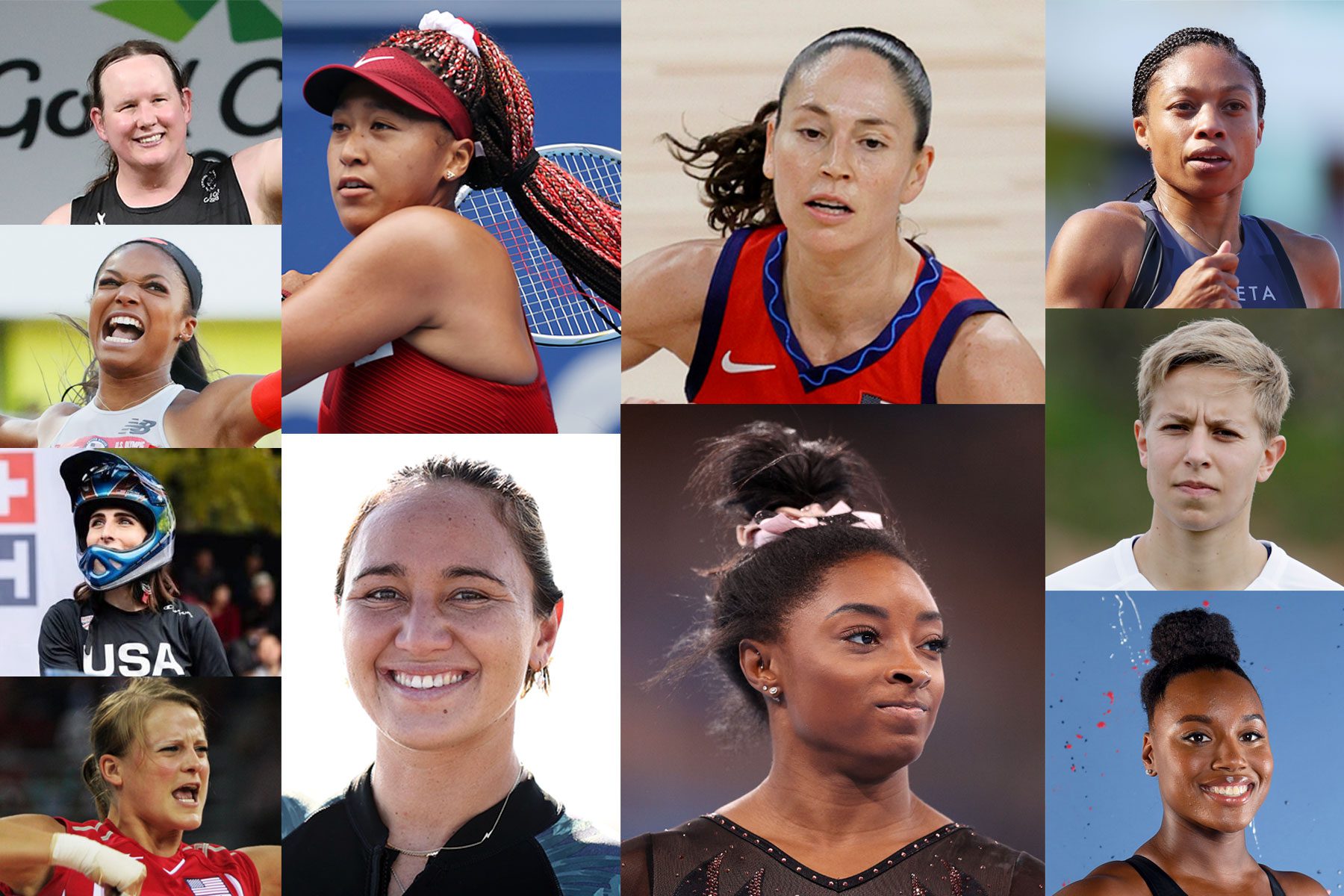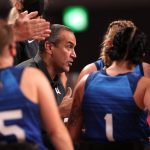The Olympics are now in full-swing, and over the opening weekend there has already been plenty of drama and upsets. Here are the athletes and teams The 19th staff is cheering on during the Games.
I love the Summer Games so much because it reminds us of our collective humanity and pushes us all towards our highest and best selves.
This year, I’ve got my eye on the two Simones: swimmer Simone Manuel and the G.O.A.T., gymnast Simone Biles. Their unapologetic style and boldness make them role models, not just in the water or in the air, but in life. The way that two Black women are representing themselves so well and expanding our imaginations about who can dominate in sports that are lacking in diversity is truly inspiring.
I was also so excited to see Sue Bird carrying the American flag during the Parade of Nations at the Opening Ceremonies. I have been a Sue Bird stan, and in choosing her, I think our country sends a message about what leadership looks like, why equality and representation matter and who we value as our champions. But this symbolism should also translate into substance at home after the glow of the Games has worn off. — Errin Haines, editor at large
Naomi Osaka may be one of the athletes with the most star power and name recognition in Tokyo, and I am sure I will be in good company as I closely track her activity throughout the games.
The tennis player will compete for the first time since she withdrew from the French Open earlier this year after officials denied her request to miss press conferences due to safeguard her mental health. Her appearance in the games is significant for a number of reasons, one of which being that she is expected to be a serious contender to bring home the gold in women’s singles for Japan.
I’ll surely be watching Osaka’s unmatched power and prowess on the court as she makes a run for the gold. I will also be closely tracking how she uses her platform and interacts with the media after her break, during which she pushed for destigmatizing struggles with mental health among professional athletes. And she is no stranger to social justice advocacy: At the 2020 U.S. Open, Osaka wore face masks bearing the names of Black Americans killed by police, drawing more global attention to racial injustice and police brutality.
As Osaka takes the world stage yet again in Tokyo with hopes of adding more championships to her resume, she is sure to continue to prove herself as a leader and a force to be reckoned with both on and off the court. — Abby Blachman, product engineer
Team USA’s Chelsea Wolfe has been on the frontlines in the battle for trans inclusion in sports, challenging stereotypes about transgender women in competition and using her platform to bat back anti-trans legislation in states. This week she makes history of her own as an alternate in the BMX freestyle category at the games, which could make her one of the first trans people at the Olympics. — Kate Sosin, LGBTQ+ reporter
I’m not ashamed to admit that my daughter’s obsession with the 2020 American Girl Doll of the Year, Joss Kendrick, got me really interested in women’s surfing, which is why I am especially eager to watch Carissa Moore compete for Team USA in the inaugural women’s surfing events in Tokyo this year.
A huge part of the fictitious Joss Kendrick’s story is about holding multiple identities at once, and defying other people’s expectations of you based on those identities. Joss is deaf, wears a hearing aid and is fluent in American Sign Language.
I can’t help but see a lot of Joss in Carissa Moore, a prodigy-level surfer who has been vocal about the ways that expectations of what women’s bodies should look like has impacted her own journey in her sport. Moore has been vocal about how the pressure to meet certain — very publicly articulated — cultural standards of “surfer girls” led to a history of disordered eating.
Not to mention that Moore is famous for ability to land airs, the move that Joss strives to perfect all throughout the introductory book in her series.
With women’s surfing finally making its Olympic debut after its long history of being plagued by sexism, I can’t wait to watch Moore finally get her chance to compete — finally — at the Olympics, and I can’t wait to watch her perform as a family. I’m sure our Joss doll will have the seat of honor. — Jennifer Gerson, breaking news reporter
American Allyson Felix could make history in Tokyo.
Already a nine-time Olympic medalist in track and field (including six gold medals — a record), Felix will become the most decorated Olympian in women’s track-and-field history if she reaches the podium in any one of the three events she’s competing in.
At 35, Felix is making her fifth Olympic appearance but her first as a mother: She gave birth to her daughter, Camryn, in 2018. Her experience with motherhood has made her one of the most vocal supporters of more fair treatment for pregnant athletes. Ahead of the Olympics, Felix is helping Olympic athletes with child care costs. — Barbara Rodriguez, statehouses reporter
Laurel Hubbard’s stunning comeback from what many thought would be a career-ending injury in 2018 would be enough to put the New Zealand weightlifter on our radar as she makes her Olympic debut at 43. But Hubbard also makes history this year as an out transgender person to compete in the games, the first ever to qualify to compete. — KS
When American Lora Webster takes the court at the Paralympics Games in Tokyo, which is scheduled to run from late August to early September, it will mark her fifth Paralympics as part of the U.S. sitting volleyball team. She won gold in the 2016 Paralympics in Rio de Janeiro, and she and her teammates also won silver in 2012 and 2008, and bronze in 2004.
Webster expects to be about 20 weeks pregnant when she competes this time. She was pregnant with her second child at the 2012 London Paralympic Games.
“My body knows what to do and my body is in volleyball shape,” she told The 19th. “For me it’s really not going to be a factor. I feel good. I feel strong and healthy. And as long as those things continue, we’re going to treat it just like any other pregnancy and any other games. The focus while we’re there is volleyball.” — BR
Before the U.S. Women’s National Team played their first game at the Olympics, they were undefeated in 44 straight matches. That came to an end in their first game against Sweden, a 3-0 loss that shocked the world. They have since bounced back with a 6-1 win over New Zealand and are scheduled to play Australia on Tuesday.
On the pitch, their journey to Tokyo was just about perfect. But off the pitch, the team has been in a years-long fight for equal pay. Three months before their 2019 World Cup win, the team filed a lawsuit against the U.S. Soccer Federation, arguing that it engages in “institutionalized gender discrimination.”
In May 2020, a judge ruled against the team, rejecting their claim that the USWNT is paid less than their male counterparts. On Friday, the team filed an appeal, saying the 2020 ruling “defies reality.”
It’s a lawsuit that may go on for years and could ultimately serve as a blueprint for other women athletes fighting for equal pay. Regardless of how long it takes, I’ll be supporting them — on the field and in the courtroom. — Annelise McGough, newsletter editor
OL Reign midfielder Quinn, the first out nonbinary Olympian, returns to the Games this year on Canada’s National Women’s Soccer Team. They won bronze at the 2016 Summer Olympics in Rio and competed at their first FIFA Women’s World Cup in 2019, and later came out as transgender in September 2020.
Quinn started playing soccer at 5, enjoys cycling and hiking, and graduated from Duke University in 2018 with a degree in biology. Canada’s next match is Tuesday, where they face off against Great Britain. — Orion Rummler, breaking news reporter
Growing up, Gabby Thomas considered playing softball. She joined the track-and-field team after watching Felix, a highly decorated U.S. Olympic athlete, run the 200 meter sprint.
Now, Thomas is the second-fastest woman of all time in the 200 meters with a time of 21.61, which she set at the 2020 Olympic Trials.
She overcame a health scare earlier this year after experiencing pain in her hamstring. Thomas learned doctors found a disturbing discovery — a tumor on her liver. “I remember telling God, I was like ‘If I’m healthy, I’m going to go out and win trials,’” she told NBC. “If this is not cancer, I will make this team.”
After finding out her tumor was benign, Thomas kept her promise and made Team USA. No one, including Thomas herself, expected to cross the finish line in 21.61 seconds. The only other runner to finish the 200 meters faster was the legendary Florence Griffith Joyner in 1988.
I’m watching Thomas because of her strength and passions on and off the field. Thomas wants to pursue a career in health care administration to eliminate inequalities within the system, specifically ones that have failed Black people for decades.
So though I’m excited to watch her take gold home for the U.S., and I’m even more excited to see what impact she will have in the future in the health care space. — Clarice Bajkowski, creative director
I love the Olympics for the fanfare, and our multi-national family likes to root for all of the different countries from our blended roots.
This summer, I’m especially cheering for Ona Carbonell, the Spanish synchronized swimmer who decided to leave her breastfeeding baby at home for the 20-day span of the events because of the Japanese government’s rules for where the infant would need to stay, restrictions due to COVID-19 that she said were too difficult for her family.
I can’t speak for every nursing parent, but as a nursing mom myself, pumping has long been a total mind-you-know-what. It is hard to concentrate on anything but your full breasts. The term distracting is an understatement.
I can barely keep it together at the end of a few-hour night out without kids. Once I do pump, it’s never the same amount or same feeling of pressure relief as actually nursing the baby.
I hope Carbonell, an elite athlete with surely better mental and physical discipline than this journalist and college professor, crushes her competitors. Either way, I’m empathizing with her about the struggle of being away from your baby with little time to prepare. — Christina Bellantoni, contributing editor





